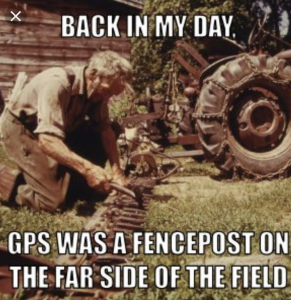The image below is more than just a funny meme. It depicts how generations of farmers painted the canvas of their fields. The farm I grew up on consisted of a 160-acre field, complete with waterways, hills, wet holes, varying soil types, point rows, and in spots, contest-winning yield potential. We annually split the field down the middle, rotating corn and soybeans. How did we know where to divide it?
At the 80-acre mark, there’s an old hedge tree still growing at the far end of the field. This served as the mid-way marker. When starting endrows, you’d point the tractor toward the tree and do your best to steer a straight path toward it. That was back when planting “straight rows” was an art form. It was a sense of pride among farmers; the results unveiled a few weeks after planting for all passers-by to bear witness. I’ll never forget the day – during my first year of farming on my own – when an old landlord, Orville Larson (who drove by his farm at least once a week, observing it with the detailed eye of an OSHA inspector) stopped by to offer this reflection. In his deep Scandinavian accent, Orville methodically acknowledged, “Well, your rows sure are straight, so I guess you know what you’re doing.” Sadly, planting straight rows is largely a lost art. The vast majority of tractors are now equipped with auto-steer, featuring a GPS guidance system that literally drives the tractor up and down the field, based on coordinates. Operators are now basically passengers. A steady hand and that ruler in the back of your head is no longer required. But technology always advances, and now, current auto-steer systems may enter obsolescence. John Deere just upped the ante by announcing a partnership with none other than Starlink (part of Elon Musk’s SpaceX) to launch SATCOM, which leverages Starlink’s world-leading satellite internet constellation. But hey, if there’s ever a problem in space, maybe there’ll be jobs again for old tractor drivers like me.

“Farming” has forever been a term associated with sustaining human life. George Washington declared it “the most noble employment of man.” A recent Gallup poll proclaimed it “the most respected profession.” Yet last week on the world stage – set in the small skiing village of Davos, Switzerland – an environmental activist named JoJo Mehta declared farming “ecocide” while speaking to her peers at the World Economic Forum. She called for laws that would punish crimes against nature, similar to how genocide is prosecuted. Now it’s easy for us aggies to react unkindly towards Ms. Mehta. Or even dismiss her as an extremist. But be aware that her organization, Stop Ecocide International, collaborates regularly with diplomats, politicians, corporate leaders and even faith groups. What her words – as demeaning and unpopular as they may be – should signal is self-reflection. Farmers, and those of us who support them, must go on the offensive. Farming is a highly sustainable business, practiced by the 1% of people who not only live off the land, but live on it. Yet these are humble people who far too often are reluctant to speak up. We must do a better job of not only telling our current story, but owning the narrative for our future story. This includes continued adoption of profitable and sustainable soil health and regen ag practices, while educating the public on how farming is the solution for improving the lives of everyone on the planet, as well as the planet itself.
Six inches of snow and lows in the single digits (or what Midwesterners refer to as a mild January day) essentially paralyzed the Mid-South last week. Emergency notifications on cell phones, calls for energy conservation practices, power outages, no trash pick-up, no package delivery, school closings and boil orders were the reality. Not to mention ice-covered roads serving up demolition derbies among Southern drivers. But what’s most chilling are empty grocery store shelves. This past weekend we went on an unsuccessful quest to find staples such as sausage, ham, lunch meat, fresh vegetables and cranberry juices. Even Frosted Flakes were absent. Milk was rationed. My wife literally grabbed the last carton of eggs. In talking to other shoppers, we discussed how eerie the feeling is to not have access to food. True, this is likely to be a short-term inconvenience. But it does make you pause and thank God that we live in a country with such an abundance and selection of safe, nutritious and delicious food. Few places on earth are as fortunate as we are. It starts with our rich natural resources, notably our vast farm and ranch land, and the farmers who grow our food. But also includes our many crop/livestock input manufacturers and suppliers, equipment suppliers, fuel availability, our best-in-the-world transportation system and the merchants throughout our food chain. May we never take any of this for granted. Billions of people will gladly trade places.
Related Posts

BHN’s Fertilgold® Organics Earns OMRI-Listing for 21 Products
Fertilgold® Organics, a brand of organic fertilizer products from Bio Huma Netics, Inc. (BHN) headquartered in Gilbert, Ariz., has achieved Organic Materials Review Institute (OMRI) listing for 21 initial products. Of these, 13 OMRI-listed liquid crop nutrition products are based on the company’s proprietary nutrient carrier, Micro Carbon Technology®, which carries nutrients to plants more...

Caffeine in Our Water Supply: Do Our Habits Pollute the Environment?
Caffeine is excreted by the body and flushed into our wastewater. Wastewater, in turn, is treated and recycled back into the environment, or––in some cases––directly back into drinking water.

This Week in Ag #51
Back in the mid-1980s, this then-high school student attended a farmer meeting with dad. One of the speakers was a commodities advisor. He playfully asked the attendees what their target price was for their crops. He further inquired, “How many of you are still holding out for the return of $12 soybeans?” The sheepish looks...

